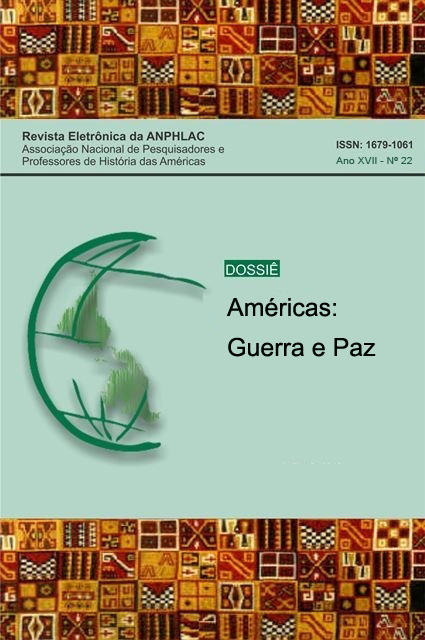Global intellectual search and hemispheric balancing acts: the international face of Brazil’s quest for national development in the Cold War
DOI:
https://doi.org/10.46752/anphlac.22.2017.2650Resumo
Even though during its so-called developmentalist period Brazilian leaders sought to actively engage with similar events taking place globally, the historiography on the period continues to be remarkably silent on these important intellectual and political connections. The present article seeks to address this analytical silence by offering a comparative assessment of development-related reflections taking place in Brazil as well as in other parts of the emergent world in the aftermath of World War II. The piece also examines how the Brazilian government promoted its developmental goals by engaging in innovative foreign policy projects (e.g. Operation Pan-America) as a way to demonstrate the convergence between domestic developmental ideas and the country’s main international diplomatic actions.
Downloads
Referências
ABREU, Alzira Alves de. Os suplementos literários: os intelectuais e a imprensa nos anos 50. In: ABREU, Alzira Alves de. (Ed.). A Imprensa em Transição: O Jornalismo Brasileiro nos Anos 50. Rio de Janeiro: Editora da FGV, 1996, pp. 13-60.
ALEXANDER, Robert J. Juscelino Kubitscheck and the Development of Brazil. Athens, Ohio: State University of Ohio Center for International Studies, Monographs in International Studies, 1991.
AMSDEN, Alice. Asia’s Next Giant: South Korea and Late Industrialization. Oxford: Oxford University Press, 1989.
AHN, Yeonmi. The Political Economy of Foreign Aid: The Nature of American Aid and Its Impact on the State-Business Relationship in South Korea, 1945-1972. Ph.D. Dissertation, Yale University, 1992.
ARNDT, H. W. Economic Development: The History of an Idea. Chicago: University of Chicago Press, 1987.
BENEVIDES, Maria Victoria de Mesquita. O governo Kubitschek: desenvolvimento econômico e establidade política, 1956-1961. Rio de Janeiro: Paz e Terra, 1976.
BERGERON, Suzanne. Fragments of Development: Nation, Gender, and the Space of Modernity. Ann Arbor: University of Michigan Press, 2004.
BOETKE, Peter J. (Ed.). The Collapse of Development Planning. New York: New York University Press, 1994.
BRADELY, Mark P. Decolonization, the global South, and the Cold War, 1919-1962. In: LEFFLER, Melvyn P.; WESTAD, Odd Arne (Eds.). The Cambridge History of the Cold War. Volume 1. Cambridge: Cambridge University Press, 2010.
BUENO, Clodoaldo; CERVO, Amado. A Política Externa Brasileira, 1822-1985. São Paulo: Ática, 1986.
CALDAS, Ricardo W. A Politica Externa do Governo Kubitscheck. Brasilia: Thesaurus, 1996.
CARDOSO, Fernando Henrique. Autoritarismo e Democratização. Rio de Janeiro: Paz e Terra, 1975.
CHATTERJEE, Partha. Nationalist Thought and the Colonial World: A Derivative Discourse. Minneapolis: University of Minnesota, 1993.
CHIBBER, Vivek. Locked in Place: State-Building and Late Industrialization in India. Princeton: Princeton University Press, 2003.
CORBISIER, Roland. Formação e Problema da Cultura Brasileira. Rio de Janeiro: ISEB, 1959.
______. JK e a luta pela Presidência. Rio de Janeiro: Duas Cidades, 1976.
DARNTON, Christopher. Asymmetry and Agenda-Setting in US-Latin American Relations: Rethinking the Origins of the Alliance for Progress. Journal of Cold War Studies, 14, no. 4, 2012, p. 55-92.
EVANS, Peter B. Embedded Autonomy: States & Industrial Transformation. Princeton: Princeton University Press, 1995.
________. Predatory, Developmental, and Other Apparatuses: A Comparative Political Economy Perspective on the Third World State. Sociological Forum, Vol. 4, No. 4, Special Issue: Comparative National Development Theory and Facts for the 1990s. (Dec., 1989), p. 561-587.
FASSY, Amaury Santos. JK: o maior estadista do século XX. Brasília: Thesaurus, 2000.
FISHLOW, Albert. Some Reflections on Comparative Latin American Performance and Policy. Helsinki: World Institute for Development Economics Research, 1987.
FURTADO, Celso. Desenvolvimento e Subdesenvolvimento. Rio de Janeiro: Fundo de Cultura, 1961.
______. Formação Econômica do Brasil. São Paulo: Fundo de Cultura, 1959.
GERSCHENKRON, Alexander. Economic Backwardness in Historical Perspective. Cambridge: Harvard University Press. 1962.
GOMES, Angela de Castro. O Brasil de JK. Rio de Janeiro: FGV, 1991.
GORDON, Lincoln. A New Deal for Latin America: The Alliance for Progress. Cambridge: Harvard University Press, 1963.
HAGGARD, Stephan. Pathways from the Periphery: The Politics of Growth in the Newly Industrializing Countries. Ithaca, NY: Cornell University Press, 1990.
HAGOPIAN, Frances. The Politics of Oligarchy: The Persistence of Traditional Elites in Contemporary Brazil. Ph.D. Dissertation, Department of Political Science, MIT, 1986.
HALPERIN, Sandra. Re-Envisioning Development: A horizontal perspective. London: Routledge, 2013.
HIRSCHMAN, Albert O. Journeys Toward Progress: Studies of Economic Policy-Making in Latin America. New York: W.W. Norton, 1963.
______. The Strategy of Economic Development. New Have: Yale University Press, 1958.
______. Ideologies of Economic Development in Latin America. In: HIRSCHMAN, Albert (Ed.) Latin American Issues, Essays, and Commnents. New York: The Twentieth Century Fund, 1961.
IORIS, Rafael R. Transforming Brazil: A History of National Development in the Postwar Era. New York: Routledge, 2014.
______. Fifty Years in Five and What is in it for Us? Development Promotion, Populism, Industrial Workers and the Case of Carestia in 1950s Brazil. Journal of Latin American Studies, volume 44, issue 02, June 2012, p. 261-284.
JOHNSON, Chalmers. MITI and the Japanese Miracle: The Growth of Industrial Policy, 1925-1975. Stanford: Stanford University Press, 1982.
JAGUARIBE, Hélio. Condições Institucionais do Desenvolvimento. Rio de Janeiro: ISEB, 1958.
______. O Nacionalismo na Atualidade Brasileira. Rio de Janeiro: ISEB, 1958.
KOHLI, Atul. State-Directed Development: Political Power and Industrialization in the Global Periphery. Cambridge: Cambridge University Press, 2004.
LONG, Tom. Latin America Confronts the United States: Asymmetry and Influence. Cambridge University Press, 2015.
LOPEZ-MAYA, Margarita, The Change in the Discourse of US-Latin American Relations from the End of the Second World War to the Beginning of the Cold War. Review of International Political Economy, vol. 2, No. 1 (Winter, 1995), p. 135-149.
LOUREIRO, Felipe. The Alliance For or Against Progress? US–Brazilian Financial Relations in the Early 1960s. Journal of Latin American Studies 46, no. 2, 2014, p. 323-351.
LOUZEIRO, José. JK: o otimismo em pessoa. Rio de Janeiro: Ediouro, 1996.
LOVE, Joseph L. A Construção do Terceiro Mundo: Teorias do Subdesenvolvimento na Romênia e no Brasil. São Paulo: Paz e Terra, 1998.
______. Raul Prebisch and the Origins of the Doctrine of Unequal Exchange. Latin American Research Review 15, no. 3, 1980, p. 45-72.
MENDES DE ALMEIDA, Candido. Nacionalismo e Desenvolvimento. Rio de Janeiro: Instituto Brasileiro de Estudos Afro-Asiáticos, 1963.
NKRUMAH, K. African Prospects. Foreign Affairs. August 1958.
OLIVEIRA, Juscelino Kubistchek de. Exposição da Operação Pan-Americana às Forças Armadas no Palácio do Itamaraty, no dia 17 de julho de 1958. Rio de Janeiro: Ministério das Relações Exteriores, Seção de Publicações, 1958.
______. Interview with O Jornal do Brasil. July 17, 1959, published in Artigos e Entrevistas Sobre a Operação Pan-Americana. Rio de Janeiro: Ministério das Relações Exteriores, Seção de Publicações, 1960.
______. Mensagem ao Congresso Nacional. Rio de Janeiro: Departamento de Imprensa Nacional, 1956.
______. Operación Pan Americana: Compilacion de Documentos – I. Rio de Janeiro: Servicio de Documentación de la Presidencia de la Republica, 1958.
PEMPEL, T. K. The Developmental Regime in a Changing World Economy. In: WOO-CUMINGS, Meredith (Ed.). The Developmental State. Ithaca: Cornell University Press, 1999.
PINEDA, Yovanna. Industrial Development in a Frontier Economy. The Industrialization of Argentina, 1890-1930. Stanford University Press, 2009.
PINHEIRO, Letícia. Ação e omissão: a ambiguidade da política brasileira frente ao processo de descolonização africana, 1946-1960. Dissertação de Mestrado defendida no Instituto de Relações Internacionais da PUC-RJ, 1988.
PRADO, Maria Emilia. Os intelectuais e a eterna busca pela modernização do Brasil: o significado do projeto nacional-desenvolvimentista das décadas de 1950-60. História Atual Online, no. 15, 2008, p. 19-27.
PREBISCH, Raul. The Economic Development of Latin America and its Principal Problems. New York: United Nations Department of Economic Affairs, 1950.
QUEUILLE, Pierre. Histoire de l’afro-asiatisme jusqu’à Bandung. Paris: Payot, 1965.
RABE, Stephen G. Eisenhower and Latin America: The Foreign Policy of Anticommunism. Chapel Hill: University of North Carolina Press, 1988.
RAMOS, Alberto Guerreiro. A Redução Sociológica. Rio de Janeiro: ISEB, 1958.
RODRIGUEZ, Marly. A década de 50: Populismo e metas desenvolvimentistas no Brasil. São Paulo: Ática, 1994.
RODRIGUEZ, Octavio. Teoria do Subdesenvolvimento da Cepal. Rio de Janeiro: Forense Universitária, 1981.
ROXBOROUGH, Ian. Theories of Underdevelopment. London: Macmillan, 1979.
SACHS, Ignacy. Capitalismo de estado e subdesenvolvimento. Petrópolis: Vozes, 1969.
SANTOS, Joaquim Ferreira dos. Feliz 1958: O ano que não deveria terminar. São Paulo: Record, 1997.
SANTOS, Pedro Augusto Gomes. A classe média vai ao paraíso: JK em Manchete. Porto Alegre: Edipucrs, 2002.
SCHNEIDER, Ben Ross. The Desarollista State in Brazil and Mexico. In: WOO-CUMINGS, Meredith (Ed.). The Developmental State. Ithaca: Cornell University Press, 1999.
SCOTT, James. Seeing Like a State: How Certain Schemes to Improve the Human Condition Have Failed. New Haven: Yale University Press, 1998.
SHAPIRO, Helen. State Intervention and industrialization: The Origins of the Brazilian Automotive Industry. Ph.D. Dissertation, Department of Economics, Yale University, 1988.
SHEAHAN, John. Early Industrialization and Violent Reaction: Argentina and Brazil. University of Sussex: Institute of Development Studies, 1982. Discussion Paper 176.
SIKKINK, Katryn. Ideas and Institutions: Developmentalism in Brazil and Argentina. Ithaca: Cornell University Press, 1991.
SILVA, Alexandra Mello e. A Política Externa de JK: a Operação Pan-Americana. Dissertação de Mestrado defendida no Instituto de Relações Internacionais da PUC-RJ, 1992.
SILVA, Hélio Silva; CARNEIRO, Maria. Juscelino, o desenvolvimento, 1956-61. São Paulo: Editora Três, 1983.
SZUSTERMAN, Celia. Frondizi and the Politics of Developmentalism in Argentina, 1955-62. Pittsburgh: University of Pittsburgh Press, 1993.
TAFFET, Jeffrey F. Foreign Aid as Foreign Policy: The Alliance for Progress in Latin America. New York: Routledge, 2007.
TOLEDO, Caio Navarro de. ISEB: Fábrica de ideologias. São Paulo: Ática, 1977.
______. (Org.). Intelectuais e política no Brasil: a experiência do ISEB. São Paulo: Revan, 2005.
VELIZ, Claudio. The Centralist Tradition in Latin America. Boulder: Westview Press, 1980.
VIEIRA PINTO, Álvaro. Ideologia e Desenvolvimento Nacional. Rio de Janeiro: ISEB, 1960.
VIZENTINI, Paulo G. F. As Relações Exteriores do Brasil:1945-1964. Petrópolis: Vozes, 2004.
WADE, Robert. Governing the Market: Economic Theory and Role of Government in East Asian Industrialization. Princeton: Princeton University Press, 1990.
WALKER, Michael. The Cold War and the Making of the Modern World. London: Fourth State Press, 1993.
WALLERSTEIN, Immanuel. The Concept of National Development, 1917-1989: Elegy and Requiem. American Behavioral Scientist, 35, p. 517-529.
WEIS, Michael. The Twilight of Pan-Americanism: The Alliance for Progress, Neo-Colonialism, and Non-Alignment in Brazil, 1961-1964. The International History Review 23, no. 2, 2001, p. 322-344.
Downloads
Publicado
Como Citar
Edição
Seção
Licença
a. Cessão de direitos autorais
Venho, por meio desta, ceder em caráter definitivo os direitos autorais do artigo "____________", de minha autoria, à Revista Eletrônica da ANPHLAC e afirmo estar ciente de que estou sujeito às penalidades da Lei de Direitos Autorais (Nº9609, de 19/02/98) no caso de sua infração. Autorizo a Revista Eletrônica da ANPHLAC a publicar a referida colaboração em meio digital, sem implicância de pagamento de direitosautorais ou taxas aos autores.
b. Declaração de ineditismo e autoria
Atesto que o artigo ora submetido à Revista Eletrônica da ANPHLAC, intitulado "________________________", de minha autoria, nunca foi publicado anteriormente, na íntegra ou em partes, dentro do país. Vindo a ser publicado na Revista Eletrônica da ANPHLAC, comprometo-me a não republicá-lo em qualquer outro veículo editorial.






